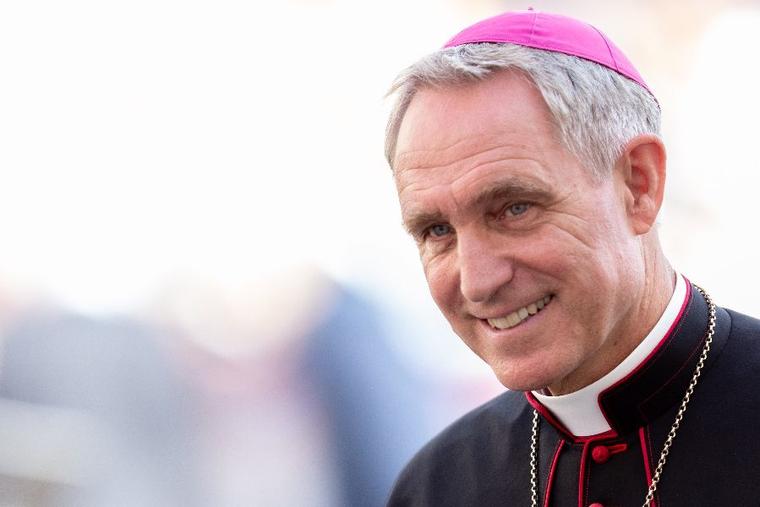- Feb 5, 2002
- 166,633
- 56,268
- Country
- United States
- Faith
- Catholic
- Marital Status
- Married
- Politics
- US-Others
NEWS ANALYSIS: He returned to Maria Vesperbild, not just as a celebrant but as a beacon of faith for many — and a point of personal connection to the late Bavarian pontiff, Benedict XVI.
In the bustling heart of Catholicism that is Rome, Archbishop Georg Gänswein once stood as a close aide to Pope Emeritus Benedict XVI. On Tuesday, the former prefect of the Papal Household found himself seeking solace in a tiny Bavarian hamlet called Maria Vesperbild, which typically boasts a modest population of 34.
Yet, on the Solemnity of the Assumption of Mary, this quiet village in Bavaria’s Swabian district was transformed, drawing several hundred pilgrims, all eager to witness the archbishop’s return to the public eye.
The contrast was stark: from the grandeur of Vatican corridors to the serene simplicity of a rural shrine dedicated to Our Lady. But it was here, amid the rolling wooded hills and devout pilgrims, that Archbishop Gänswein’s voice resonated with poignant clarity, calling to attention the significance of the day.
“We can only be grateful to mother Church that she has refrained from taming or dumbing down the faith, preferring to expose herself to ridicule and incomprehension rather than end up as a slick and indifferent thing that no one will disagree with but that no one will celebrate anymore,” the prelate said.
“Mary’s assumption promises the acceptance that every person longs for.”
Speaking publicly for the first time since leaving Rome after the death of Benedict, Archbishop Gänswein made it disarmingly clear that he is no stranger to emotional turmoil and desolation.
“Every person longs to be accepted,” the 67-year-old reflected during his sermon, a sentiment that seemed to echo his personal journey. The archbishop alluded to the many doors that had been shut in his face, the “slander from the shadows,” and the profound feelings of loneliness one can grapple with.
His words struck a chord, not just for their theological depth, but because they revealed a man coming to terms with his past and seeking a path forward.
Continued below.

 www.ncregister.com
www.ncregister.com
In the bustling heart of Catholicism that is Rome, Archbishop Georg Gänswein once stood as a close aide to Pope Emeritus Benedict XVI. On Tuesday, the former prefect of the Papal Household found himself seeking solace in a tiny Bavarian hamlet called Maria Vesperbild, which typically boasts a modest population of 34.
Yet, on the Solemnity of the Assumption of Mary, this quiet village in Bavaria’s Swabian district was transformed, drawing several hundred pilgrims, all eager to witness the archbishop’s return to the public eye.
The contrast was stark: from the grandeur of Vatican corridors to the serene simplicity of a rural shrine dedicated to Our Lady. But it was here, amid the rolling wooded hills and devout pilgrims, that Archbishop Gänswein’s voice resonated with poignant clarity, calling to attention the significance of the day.
“We can only be grateful to mother Church that she has refrained from taming or dumbing down the faith, preferring to expose herself to ridicule and incomprehension rather than end up as a slick and indifferent thing that no one will disagree with but that no one will celebrate anymore,” the prelate said.
“Mary’s assumption promises the acceptance that every person longs for.”
Speaking publicly for the first time since leaving Rome after the death of Benedict, Archbishop Gänswein made it disarmingly clear that he is no stranger to emotional turmoil and desolation.
“Every person longs to be accepted,” the 67-year-old reflected during his sermon, a sentiment that seemed to echo his personal journey. The archbishop alluded to the many doors that had been shut in his face, the “slander from the shadows,” and the profound feelings of loneliness one can grapple with.
His words struck a chord, not just for their theological depth, but because they revealed a man coming to terms with his past and seeking a path forward.
Continued below.

Marian Embrace: Archbishop Gänswein Speaks of Loneliness and Solace in First Public Appearance
NEWS ANALYSIS: He returned to Maria Vesperbild, not just as a celebrant but as a beacon of faith for many — and a point of personal connection to the late Bavarian pontiff, Benedict XVI.
